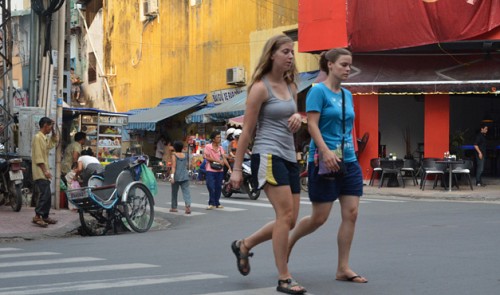At a meeting held on Thursday, many National Assembly (NA) deputies proposed that administrative formalities should be simplified and streamlined to facilitate foreigners who enter, leave, and stay in Vietnam.
>> New rules on work permits for foreigners >> Pedestrian zone urged to be set up in backpacker area Such proposals were made during yesterday’s NA sitting that discussed the Bill on Entry, Exit, and Residence of Foreigners in Vietnam. Compared with the 2000 ordinance, the bill stipulates in more detail the rights and obligations of foreigners who come to, leave from, or reside in the country. Attendees of the meeting agreed that such a law is necessary to improve the management of foreigners in Vietnam. Many deputies agreed that the Bill should have a more strict regulation on foreigners who enter Vietnam for working purposes to avoid the arrival of foreigners in Vietnam with only a travel visa who then overstay their visa to engage in work without a work permit. Also, foreigners should not be allowed to make changes to their registered purposes on entry, except in some special cases that are subject to regulations by the Government.Simplification required However, along with regulations that are aimed at better controlling foreigners in Vietnam, the bill should also provide for provisions that facilitate international visitors during their entry, exit, and residence in the country.

A group of foreign visitors walks in Pham Ngu Lao backpacker area in a photo taken on September 5, 2013.Photo: (Quynh Trung)
Regarding visas, some deputies proposed that bill drafters should provide for a visa validity term that is longer than 12 months to facilitate foreign investors in Vietnam. As for visa exemption for foreigners who travel in Vietnam, many deputies said that such exemption should not be given only to those who enter Vietnam by air, since international visitors can also arrive in Vietnam by sea or by road. Regarding declaration of temporary residence by foreign visitors, Tran Ngoc Vinh, a deputy from Hai Phong City, said that in many other countries, foreigners are not required to report anything after they have fulfilled all entry procedures at airports. In contrast, after airport entry procedures in Vietnam, foreigners are required to report where they will stay. Vinh said, “Temporary residence declaration procedures should be simplified for foreigners and should mirror international practices to avoid inconveniencing foreigner visitors.” Vinh and many other deputies also said a number of bans provided for in the bill are vague and therefore difficult to apply.

In this file photo foreigners are seen in an area of Hanoi where items for Tet (lunar New Year) are sold (Photo: Tuoi Tre)
Nguyen Thi Phuong Dao, a deputy from Ben Tre, said that the bill drafters should review the regulation that foreigners are allowed to stay in transit passenger areas at airports within 72 hours. Phuong said the time limits should be expanded since in cases of force majeure, such as disasters, air passengers will have to stay longer. Most deputies agreed to the new regulation that the residence card for foreigners in Vietnam is now valid for 10 years instead of the previous 3 years. According to the Vietnam Tourism Administration, the number of international visitors to Vietnam increases each year, with about 5.85 million foreign visitors to Vietnam in the Jan-November period, up 10.2 percent from the previous year. Of these arrivals, 5.413 million are by air, 183,500 by sea, and 1,252 by road.





















































